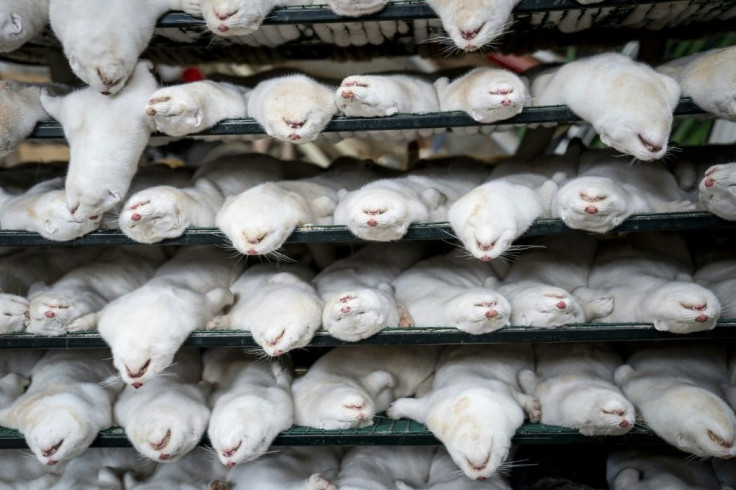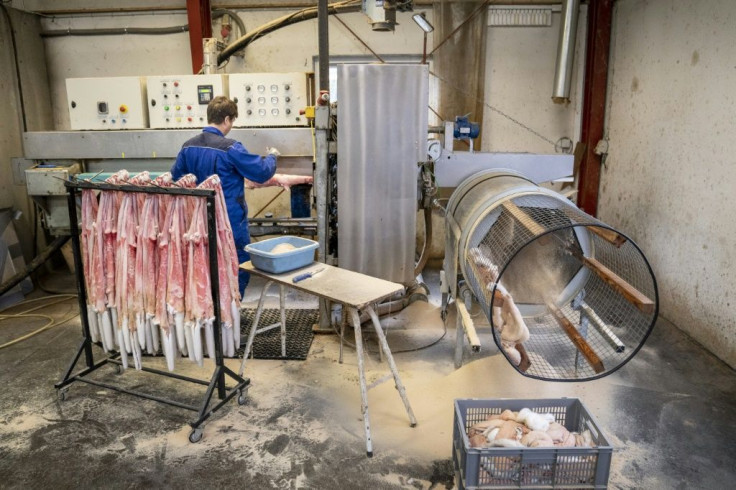Denmark Says Corona Mink Mutation 'Most Likely Eradicated'
Two weeks after sounding the alarm about a mutated variant of the new coronavirus in minks that could threaten the effectiveness of a future vaccine, Denmark said Thursday the strain has likely been eradicated.
Noting that no new cases had been detected since September 15, the government said most of the strict restrictions it had imposed on November 5 on seven municipalities in the North Jutland region, home to 280,000 people, would be lifted on Friday.
But Denmark, which had ordered a nationwide cull of all its 15 to 17 million minks, has already killed around two-thirds of stocks and plans to carry out the full cull to avoid any new mutation.
"There have been no new cases of the 'Cluster 5' mink mutation since September 15, which has led the Danish infectious disease authority SSI to conclude that this variant has most likely been eradicated," the health ministry said in a statement.
SSI told AFP no cases had been detected in either people or minks since that date.
While the problem posed by 'Cluster 5' for vaccines was only made public in early November, the variant was detected in minks and 12 people in August and September.

With three times more minks than people, the Scandinavian country is the world's biggest exporter, selling pelts for around 670 million euros ($792 million) annually, and the second-biggest producer behind China.
But the animal has posed a problem in the fight against the new coronavirus. The minks can catch the virus, and also pass it back to humans, and Denmark, like several other countries in Europe, began culling sick minks this summer.
Ireland said Thursday that it was planning a nationwide cull of mink on its commercial farms, which are reported to house around 100,000 animals.
Since ordering the cull in early November, the Danish government has been forced to admit that it had no legal power to order healthy minks outside contaminated zones killed, and the agriculture minister resigned Wednesday.
But Prime Minister Mette Frederiksen has insisted the cull is "non-negotiable", and her government is now preparing to ban mink farming altogether until 2022.
Health authorities said initial studies had shown that future vaccines against Covid-19 could be less effective on the 'Cluster 5' variant.

Earlier Thursday, Oxford University and AstraZeneca said their potential jab had safely produced a robust immune response in older adults.
The vaccine is now in large-scale phase 3 trials to confirm the results, following in the footsteps of those developed by Pfizer/BioNTech and Moderna, which this month announced their products were effective at preventing coronavirus.
But the World Health Organization has warned that no inoculation will arrive in time to help fight a mounting second wave.
"I think it's at least four to six months before we have significant levels of vaccination going on anywhere," WHO emergencies director Michael Ryan said.
The death toll in the world's worst-affected country, the US, topped 250,000 on Thursday, with more than 11.5 million cases.
New York City plans to close schools to limit infections, while across the Atlantic in Europe Russia followed France over the two million cases mark.
Japan declared it was on "maximum alert" after a record 2,000 daily infections, while previously untouched Pacific island nation Samoa saw its first positive test.
And Indian capital Delhi quadrupled the level of fines dished out to those who refuse to wear a mask, to 2,000 rupees ($27).
"At times when words alone don't do the trick, we have to get a bit tougher," chief minister Arvind Kejriwal said.
But there was good news for Catalonia, with bars, restaurants and cinemas set to reopen from Monday in capital Barcelona and elsewhere around the wealthy Spanish region after more than a month of forced closure.
Regional vice-president Pere Aragones said Catalonia "managed to change the dynamic of the pandemic without having to resort to a strict lockdown" like in spring.
© Copyright AFP 2024. All rights reserved.





















